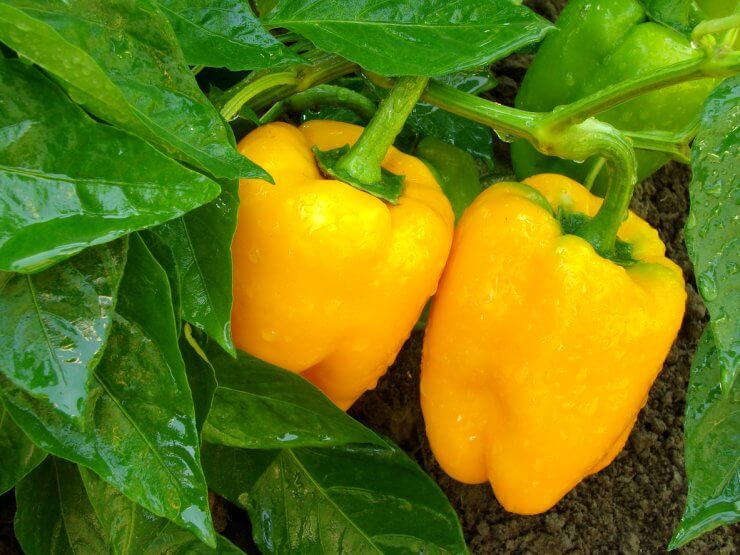
Freshly watered bell peppers in the garden
Watering
Once your bell peppers are settled in—whether it’s in a container, a raised bed, or open ground—consistency is key when it comes to watering. If you don’t get rain on a regular basis, go out and give your bell peppers a good drink of water. Bell peppers like soil that’s moist, but not soggy. Don’t kill your bell pepper plants with kindness. Water, yes—just not too much.
In general, you’ll want to water deeply about once a week, so your plants get about an inch or two of water, depending on the variety of pepper and your growing conditions. If the top of the soil is a little dry, that’s OK. But don’t let the soil dry out. Consistency is key. Lay down a layer of mulch to help retain moisture; ground-up leaves, clean grass clippings (no pesticides), or compost work well.
It’s always best to water in the morning, so your plants can soak up the water and put it to work. Watering earlier in the day also gives the sun time to burn off any water on the leaves. When you do water, aim for the base of the plant. Try not to get the leaves wet (unless you’re blasting off pests, and only do that in the morning); that can open the plant to fungal infection.
Weeding
If you’ve planted in raised beds or containers, weeds shouldn’t be much of a problem. If you do see weeds, pull them early and often—but be gentle about it. Remember that pepper plants have delicate, shallow roots. Loosen the soil gently around your plants, especially when they’re young, so you don’t disturb their roots. For raised beds and containers, this is another good reason to get yourself some fresh garden soil; it’s one less piece of aggravation to deal with during the growing season.
But even if you’re growing your bell peppers directly in the ground, properly preparing your soil is still an excellent preventive measure against the emergence of weeds. When you till or cultivate the area where you’ll plant your bell peppers, remove weeds and debris. You’ll likely find that the first few weeks after planting are the only time you’ll be pulling up weeds around your plants. Of course, there’s nothing to say you can’t amend your garden bed with a little commercially available garden soil. Give your bell peppers all the advantages you can to ensure a healthy crop.
If weeds spring up around your bell peppers during the growing season, work the soil around the base of the plants with a hand rake—only deep enough to kill the weeds and not damage the plant’s roots.
Fertilizing
In general, you’ll want to use a soluble fertilizer about 2 weeks after you plant your seedlings. You can use a balanced fertilizer until the plants flower, then switch to a high-potassium fertilizer; fertilizer formulated for tomatoes can work well. Continue fertilizing as your plants grow, according to the product directions.
After about three months of growth, apply timed-release fertilizer to your pepper plants. Some gardeners have success by adding seaweed-based products to conventional fertilizer.
How often do you have to fertilize or water your bell peppers? Do you have any particular challenges growing bell peppers? Please tell us your tips for nurturing healthy bell peppers.


 Previous
Previous

